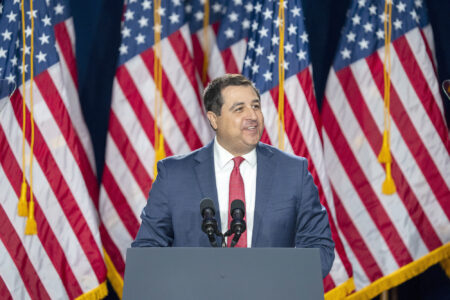Whitmer signs $81B state budget

Michigan officials pose for signing of the fiscal year 2026 budget Tuesday. From left are House Speaker Matt Hall, R-Richland Township; state Rep. Ann Bollin, R-Brighton Township, chair of the House Appropriations Committee; Whitmer; Senate Majority Leader Winnie Brinks, D-Grand Rapids; and state Sen. Sarah Anthony, D-Lansing, chair of the Senate Appropriations Committee. (Courtesy of Executive Office of Michigan, via Michigan Advance)
Gov. Gretchen Whitmer signed Michigan’s state budget for fiscal year 2026 on Tuesday after its passage through the state House and Senate early Friday.
That followed legislators passing an eight-day continuation budget shortly after the constitutional deadline Oct. 1.
“I just signed my seventh balanced, bipartisan budget that delivers on kitchen table issues: costs, roads, safety and schools,” Whitmer announced in a video. “This budget is a testament to what we can get done when we work together,”
Democrats touted the deal as “a bipartisan budget that fixes our roads, strengthens public schools, protects health care access, and insulates us from some of the toughest federal cuts,” as Senate Majority Leader Winnie Brinks, D-Grand Rapids, said in a news release from the governor’s office.
Meanwhile, Republicans, including Speaker of the House Matt Hall, R-Richland Township, focused on increased transparency and fiscal responsibility in the budget, including the elimination of about 2,000 unfilled government employee positions.
“This budget makes a significant difference in eliminating waste, fraud and abuse to lower state spending and give the taxpayers better value for their dollars,” Hall said. “That’s how we were finally able to get our local roads fixed and pass the public safety trust fund, all while eliminating taxes on tips, overtime and Social Security.”
For the coming fiscal year, the Department of Health and Human Services will take a $7.6 billion cut, while the Department of Transportation’s budget increased by $1.08 billion. Other funding increases came for the Michigan State Police, Department of Natural Resources, Military and Veterans Affairs and more.
Funding for road improvements was a key priority for Whitmer’s office in budget negotiations. The budget includes, according to the news release, “Nearly $2 billion in ongoing resources for improving state and local roads when fully implemented over the next four years,” which is set to be funded by an increased tax on cannabis products. That 24% tax, a key portion of the budget, passed by narrow margins in the Legislature.
It also includes a $21.3 billion school aid package, including funding for K-12 schools, community colleges, and higher education. That package increases per-pupil spending to $10,050, as well as maintaining free school meals and increasing funding for at-risk students.
In the press conference just after the signing, Hall repeatedly criticized Democrats for what he called a lack of transparency and wasteful spending in the process of passing the state’s budget while commending the inclusion of Republican priorities such as an end to taxes on tips, overtime and Social Security, as well as funding for local roads.
Hall gave the example of the elimination of 2,000 so-called “ghost employees” — unfilled government employee roles — as a win for Republican priorities of cutting wasteful spending, though he said there were “at least another 3,000” of those ghost employees that would have to be cut going forward.
Cutting that “waste, fraud and abuse,” which Hall repeatedly referenced in his statements, was what allowed the roads funding deal — a nearly $2 billion funding plan that was a priority for both Hall and Whitmer — to make it through negotiations, and he said that the plan could have even been larger had there been more spending cuts.
As for the cannabis tax that will fund the roads plan, Hall called it a “volatile” funding source, adding, “there’s not an easy way to determine how much money that raises.”
But he did note that education funding — more than $21 billion in a school aid package — was not cut in favor of the roads plan.
“Democrats tried to tell you that you had to pick between fixing the roads and funding education,” he said. “I always said we didn’t have to.”
Hall further emphasized that the Republican priorities in the budget delivered for working families — he told reporters that while he is the House speaker, no increased taxes on gas or on hunting and fishing registration fees would go into effect.
Senate Majority Leader Winnie Brinks, D-Grand Rapids, spotlighted Democratic priorities that remained in the budget through negotiations, including universal free breakfast and lunch for students, in a news release after the bill’s passage in the legislature Friday.
“Senate Democrats worked across the aisle to get the job done and deliver another responsible budget that boosts public education, invests in our aging roads, and protects access to health care, all while mitigating the worst effects of the devastating federal cuts. I cannot emphasize enough the importance of state legislatures in this critical, tenuous moment,” she said.
———
Michigan Advance is part of States Newsroom, a national 501(c)(3) nonprofit. For more, go to https://michiganadvance.com.





